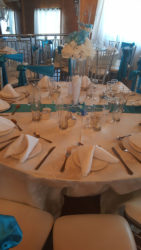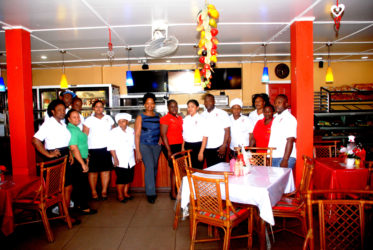At 16, force of circumstances compelled Vanessa Klass-Singh to cut short her formal education and take up a job as a counter girl at the then Salt and Pepper Restaurant on Robb Street. Hers, she says, is no “sob story,” and there is no room for teary-eyed regret over having been unable to complete her studies. “I had to work and that was that,” she says.
These days, the articulate 39-year-old mother of two believes that in every sense the strides she has made in business have compensated for the sacrifices of all those years ago. She is the proprietrix of one of the most popular restaurants in the city, Hot and Spicy, situated at the corner of Third and Light streets, Alberttown. Above the restaurant she runs the Mirage Banqueting Hall and Conference Centre, a venture which she is seeking to grow to the extent that it matches her better-known restaurant in popularity.

Surprisingly forthcoming about her impoverished past, she speaks freely about the days when, as an underprivileged child attending St George’s High School, she had come to rely on the charity of the St George’s Cathedral where the Diocese afforded needy children a midday meal. After school, she sold sweets on the streets in the vicinity of Guyana Stores.
By the time she was 16, her schooling had been sacrificed on the altar of material necessity. She went to work at Salt and Pepper and that was where she benefited from her first exposure to the food industry.

She credits the restaurant’s owner, Eric Nicolls with exposing her to all of the various aspects of the trade including managing aspects, and unhesitatingly asserts that her own success in business is due in no small measure to his mentorship. The journey from poverty to becoming a successful businesswoman has been a challenge which persisted despite the growth and expansion which the enterprise has realized. These days the Hot and Spicy enterprise comprises snackettes located at the University of Guyana, the Cyril Potter College of Education, the Eugene F Correia International Airport and Courts Main Street store. These, as well as two mobile trucks, make Hot and Spicy the largest restaurant chain in the city.
Success has come at a cost. Klass-Singh concedes that these days she has become increasingly aware of her obligations to her husband and children. But these commitments have had to compete with keeping the business going. In the circumstances she is, she says, unwilling to undertake any further expansion. She made her first appearance at the annual Wedding Expo last year, primarily to use the event as a springboard for the promotion of the Mirage.
The response, she said, was more than a little encouraging, citing her enhanced ability to network with other service providers in the entertainment sector as her biggest return from her participation. This year, she says, she will be seeking to strengthen the bridges that she has already built, striving to enhance the popularity of the event venue in the process.
It is, inevitably, to the food service side of her enterprise that she returns to review what she believes are the strengths and the weaknesses in her business. Setting aside her sojourn at the Salt and Pepper she is Carnegie-trained.
Those experiences coupled with more than two decades in the business has left her with an enduring confidence in her culinary offerings. The high level of patronage, she says, is an emphatic customer pronouncement on the quality of the wide range of foods that she offers. Good help, however, is hard to find so that she is anchored to the task of directly overseeing the food preparation.
Klass-Singh believes that Hot and Spicy remains vulnerable to charges of less than high standards of customer service. Again, she recognizes that young women who are recruited to serve as counter attendants frequently come to the job with wrinkles that must be ironed out. While that process is unfolding the controversies at the counter persist.
Over time, however, she has been able to ride out the challenges. She believes that the Hot and Spicy brand has made its mark and that her hard work has won her a solid clientele.
These days she employs more than 40 staff and has fashioned an operation which, she says, must work like clockwork if is to sustain itself. Her first wave of staff arrive at work at around 04:00 hrs to prepare breakfasts for distribution to the various outlets. Afterwards, the operation accelerates into a demanding motion that persists across the day until another demanding wave of customers is fed, then the whole exacting process begins again.








